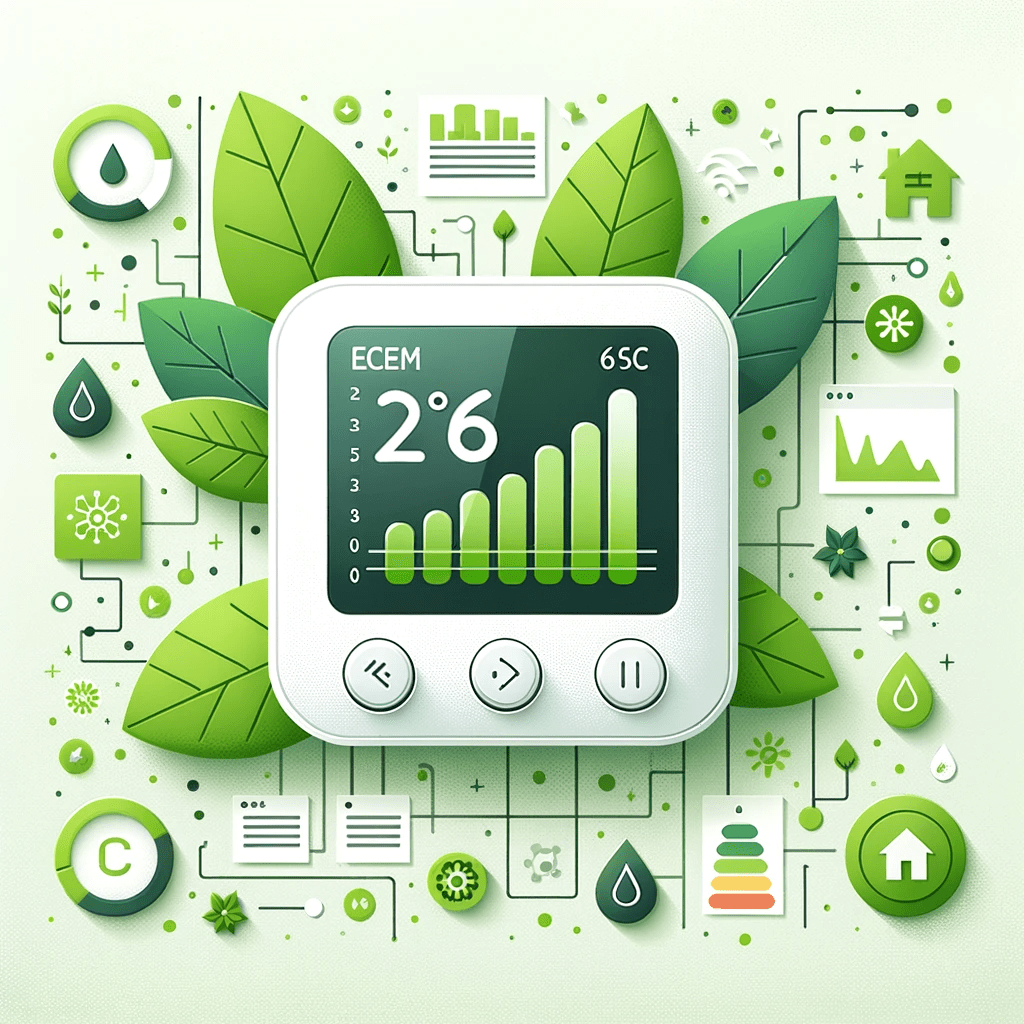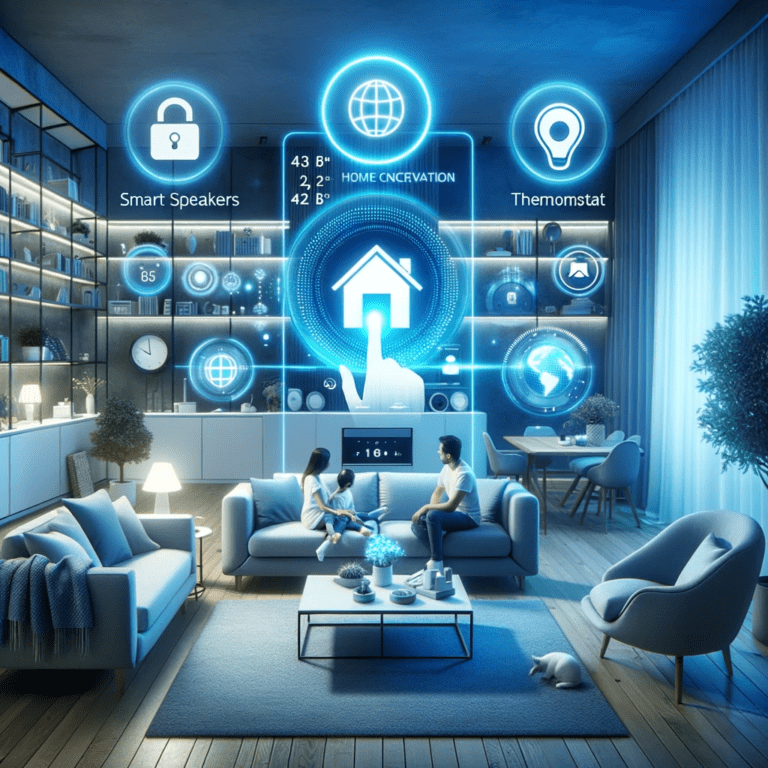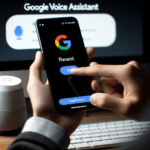Introduction to Smart Home AI: Bridging Convenience and Efficiency
In today's digital era, Smart home AI offers a remarkable demonstration of how technology enhances our daily life by bridging the gap between convenience and efficiency. As the nucleus of modern residential ecosystems, AI smart home systems bring to life an astonishing array of possibilities. Smart home AI is an ensemble of advanced technologies that integrates AI in smart homes, leveraging real-time data to simplify life, from arranging schedules to managing home security and energy consumption.
Smart home AI devices, including AI smart home cameras and AI smart home apps, play a pivotal role in this. These devices, powered by AI for smart home, can learn, adapt and predict an individual’s day-to-day requirements, facilitating a personalized and seamless living experience. An AI smart home camera, for instance, can provide enhanced security features such as facial recognition and intrusion detection. Meanwhile, an AI smart home app harnesses the power of AI and smart homes to control multiple home devices from a single interface. Undoubtedly, these AI-driven enhancements are making our homes more intuitive, responsive and, above all, smarter.

Voice-Activated Assistants: The Frontline of Smart Home AI
AI-powered smart home applications have revolutionized how we envision modern living, with voice-activated assistants leading the charge. These smart AI breakthroughs intertwine a digital control system with our everyday lives, offering a higher taste of convenience, and enhancing our security. The role of AI in smart home devices, particularly voice-activated assistants, provides an instant, hands-free control over various household operations. These AI gadgets for smart home use have refined and redefined household management in profound ways, pointing the way to a future where smart home using AI is the standard.
The dream smart home AI system embodies this idyllic vision of a home where communication with tech-savvy devices is seamless and intuitive. Voice-activated assistants now navigate ais smart home environment through innovative, AI-powered algorithms, underpinning a more responsive and efficient home system.
Predictive maintenance, home automation, and even enhanced AI smart home security are now Daily realities, courtesy of these AI-infused technologies. These smart home AI applications are constantly learning, improving, and adapting to your lifestyle preferences. They are the new vanguard, ushering us into a future where the smart home with AI is not just a techno dream, but an everyday reality.

List of Popular Smart Voice Control AI devices
| Product Name | Voice Control | Energy Efficiency | Security Features | Integration with Other Devices | User-Friendliness |
|---|---|---|---|---|---|
| Amazon Echo Dot | Yes | Moderate | Basic | Excellent | Easy |
| Google Nest Mini | Yes | High | Advanced | Excellent | Easy |
| Apple HomePod Mini | Yes | High | Advanced | Good | Moderate |
| Sonos One | Yes | Moderate | Basic | Good | Easy |
| Wyze Plug | No | High | Basic | Excellent | Easy |
| Nest Thermostat | Yes | High | N/A | Excellent | Easy |
| Ring Doorbell | No | N/A | Advanced | Excellent | Easy |
Predictive Maintenance: Smart Home AI at Work
Predictive maintenance is revolutionizing the sphere of smart home AI devices, greatly enhancing smart home user experience and overall efficiency. These devices, equipped with artificial intelligence capabilities, can perceive changes across a wide spectrum of home appliances well ahead of time, preventing potential malfunctions. By leveraging real-time diagnostic data, AI-based smart home crafts intelligence to forecast maintenance requirements, mitigating interruption to the home environment often brought about by unforeseen appliance failures. This contributes to the creation of much more responsive, intuitive, and advanced AI featured smart home automation systems.
As we advance towards the AI and smart homes of the future, predictive maintenance continues to define new horizons in how smart home AI products can not only assist but also proactively work to improve living spaces. Keeping in stride with voice AI for smart home, these devices offer voice-enabled services that make interactions all the more seamless and user-friendly.
The infusion of AI in smart home products makes the dream of fully automated residencies, where devices coordinate smoothly with minimal human intervention, a realistic prospect. This paints the picture of an AI-empowered tomorrow, where AI for smart home user experience extends beyond basic control to predictive intelligence, ensuring a hassle-free, future-ready domestic environment.

Enhanced Security: AI-powered Surveillance in Smart Homes
The rapid integration of AI in smart home devices, notably in surveillance systems, is carving a niche for itself in the smart home technology segment. Advanced AI-powered surveillance solutions come with the added advantage of encryption mechanisms, promising top-notch security for homeowners. This facet of smart home technology is proving to be a game-changer in countries like Malaysia and elsewhere. Home security systems in smart homes are becoming increasingly sophisticated, with features such as facial recognition and motion detection leading the charge.
Secondly, the intersection of AI, IoT, and smart home technology is redefining the home security landscape. AI is making smart homes safer by providing features that allow continuous monitoring, real-time data analysis, and instant alarms in case of suspicious activities. The AI IoT Smart Home evolution doesn't just stop at making homes safer; it is on the verge of a significant takeover, where predictive analytics can help anticipate potential security threats. This aspect brings to mind a certain AI movie smart home, where AI controlled and secured the house, shedding light on the potential of AI-powered surveillance in the real world.

Smart Home AI and Energy Efficiency: A Harmonious Duo
In this burgeoning era of AI-dominated technologies, we are witnessing the unfolding of what may have been considered an "AI smart home take over nightmare" just a few years ago. However, this takeover is helping us redefine our experiences with home dwellings, focusing on greater comfort, efficiency, and security through AI core competency. The highly advanced ANNKE AI floodlight camera smart WiFi home security system stands as a testament to this, providing unprecedented security through smart learning algorithms.
Expanding beyond security, the best Google smart home AI-controlled systems, Caspar AI smart home, and others are revamping energy efficiency. These systems, built on machine learning, can iteratively learn from home energy usage patterns and adjust to maximize energy efficiency. This integration ports beautifully when considering devices like the AYI AI-powered smart mirror for your home, bringing futuristic technology right into our living spaces. When it comes to building an AI to control your smart home, the focus rests not only on convenience but also on sustainability, creating a harmonious blend between smart home AI and energy efficiency.

The Evolution of User Interfaces: Smart Home AI's Contribution
Smart home AI, an amalgamation of dexterity and automation, has elevated our ability to interact with digital interfaces. Manifestations such as Google's smart home AI come close to breathing life into the dream smart home idea in AI where all our home devices communicate with each other, creating a seamless experience designed around our individual needs. Referencing a popular piece of video gaming culture, the 'deus ex mankind divided smart home ai hack', we get an intriguing impression of how AI can choreograph an orchestra of devices to create an environment responsive to our smallest desires.
Integration of AI in smart homes has advanced so much that we are now staring at an era where AI will take charge of our homes completely. The EZVIZ C6CN Pro 1080p AI smart home PT camera is an excellent example of this progression. It offers features like motion tracking and night vision, redefining security at our abodes
. Products like the Jarvis AI smart-home system assert the capacity of smart home AI to manage home operations efficiently. Furthermore, the user reviews or 'Juno AI smart home ratings' demonstrate the user satisfaction derived from these AI-imbued products. The evolution of user interfaces in the smart home AI space is indeed a stride towards precision, ease, and comprehensive control of the home environment.
Privacy Concerns: Balancing Smart Home AI with User Privacy
Smart home AI solutions are no longer a figment of our futuristic imaginations--they're a reality that's seamlessly interwoven in our daily digital lives. Whether it's ordering groceries via the voice-activated Microsoft AI smart home, controlling home appliances with Samsung AI smart home, or, utilizing the predictive intelligence of the MGH AI-based smart home automation--the prowess of AI is virtually everywhere.
Yet, with the increased convenience and efficiency, comes the specter of privacy concerns. Among the top questions being asked by potential and interested consumers are regarding the security features offered by AI tech in homes, particularly with devices like the Lighthouse AI smart security home camera.
Just like the popular 'Morebot Scout: AI-powered smart home robot', the Lighthouse AI smart security home camera reviews reinforce its credibility in protecting user privacy. The attention to privacy is ensuring data isn't forcibly stripped from consumers, it's a testament to consumer trust in the AI ecosystem.
Furthermore, innovations like 'making your own smart home AI' are gaining traction as people seek to retain control over the vast data their homes process and generate. In this vein, the smart home AI plan, which often includes features like AI that follows from room to room, promises privacy coupled with intelligent living solutions. However, such advancements don't eliminate concerns about privacy entirely, and demand a careful balancing act from providers and consumers alike.
Conclusion: The Future of Smart Home AI and Beyond
As technology continues to advance at an unprecedented rate, the potential smart home AI uses keep expanding too. Smart home devices with AI have evolved from just being a fancy gadget that homeowners can brag about, to an indispensable tool that offers convenience, safety, and energy efficiency. From voice-activated assistants that make home management a breeze to predictive maintenance capabilities that take preventive action before a breakdown occurs, smart home AI has been showcasing its prowess in various ways.
In the realm of security, smart home and building security design AI has become a focal point. Advanced surveillance systems powered by AI have given a new definition to home security, making residences safer and more secure than ever before. More tangibly, the smart home’s presence as an AI example is prolific and influential, depicting how futuristic technology can permeate the average household. The prospects of Smart home AI are undeniably exciting, with a magnified horizon that holds countless possibilities for integrating advanced tech into everyday life.
What is the role of AI in Smart Home technologies?
AI plays a crucial role in Smart Home technologies by increasing convenience and efficiency. It powers voice-activated assistants, predictive maintenance, enhanced security features, and energy efficiency implementations.
How do voice-activated assistants contribute to Smart Home AI?
Voice-activated assistants are at the frontline of Smart Home AI. They execute commands, control devices, and provide information through simple voice prompts, making life easier and more convenient for users.
What does predictive maintenance mean in the context of Smart Home AI?
Predictive maintenance in Smart Home AI involves the use of AI to predict potential issues or malfunctions in home devices before they occur. This allows for timely repairs and replacements, preventing disruptive breakdowns.
How does Smart Home AI enhance home security?
Smart Home AI enhances home security through AI-powered surveillance systems that can identify unusual activity, recognize familiar and unfamiliar faces, and even alert law enforcement in real-time.
How does Smart Home AI contribute to energy efficiency?
Smart Home AI contributes to energy efficiency by learning and adapting to user behaviors and preferences, and adjusting the energy consumption of devices accordingly. It can automate lights, adjust heating and cooling systems, and manage appliances to conserve energy.
How is Smart Home AI evolving in terms of user interfaces?
Smart Home AI is evolving user interfaces by making them more intuitive and personalized. With AI, interfaces can learn and adapt to individual users' preferences, making them easier to use and more effective overall.
What are the privacy concerns associated with Smart Home AI?
Even though Smart Home AI brings numerous benefits, it does raise some privacy concerns. These include data collection and storage, who has access to this data, how it's used, and potential vulnerabilities that could be exploited by malicious parties.
What is the future of Smart Home AI?
The future of Smart Home AI looks promising with advancements in AI technology. It's expected to become even more intuitive, efficient, and personalized. However, balancing these advancements with user privacy will be a key challenge moving forward.





Pingback: How to use AI in Stock Market Trading : 8 Best Trading Stratigies - techlooters.com
Pingback: Google Nest Home Assistant: Best Assistant for your Smart Home - techlooters.com
Pingback: Role of 5G: Accelerating IoT Adoption - techlooters.com
Pingback: How to Implement Green Tech Solutions in Your smart Home : 9 BEST Things - techlooters.com